
Artificial Intelligence & Criminal Justice was released as an ebook January 8.
This is my first local books round-up of 2025, covering 10 newly published books from the local Christian community.
Again there is a range of topics. The write-ups are primarily from Amazon and publisher / author sites.
- Benjamin Perrin, editor: Artificial Intelligence and Criminal Justice: Cases and Commentary (Canadian Legal Information Institute)
This brand new 500+ page open access ebook offers a fresh, interdisciplinary approach to the intersection of AI and criminal justice.
Edited by Prof. Benjamin Perrin, this was a collaborative effort with a group of UBC law students who are members of the UBC AI & Criminal Justice Initiative.
The casebook covers a wide range of topics, including:
• AI governance in Canada, the U.S. and the European Union;
• Deepfakes, autonomous vehicles and autonomous weapon systems;
• Predictive policing, facial recognition, probabilistic genotyping DNA and police robots;
• Access to justice through generative AI for self-represented litigants;
• Professional responsibility and best practices for lawyers working with AI tools;
• Judicial guidelines on AI use, risk assessment algorithms, evidentiary challenges and disclosure practices;
• Critical and Indigenous perspectives on AI;
• The future of AI: legal personality, criminal responsibility and existential risks.
Artificial Intelligence & Criminal Justice: Cases & Commentary blends Canadian and international perspectives, incorporating legislation, case law, policy analysis, critical commentary and multimedia content such as videos and podcasts.
Click here for your free download from the Canadian Institute for Legal Information.

Benjamin Perrin is a law professor at the University of British Columbia.
While the book is not in any way intended to be a Christian publication, the editor has made his faith very clear. Go here and here for example.
He will speak at ‘AI & Faith: A Christian Contribution to Ethical AI’ at the law school March 19.
Benjamin Perrin is a professor at the Peter A. Allard School of Law at UBC. His research and teaching interests include criminal law, constitutional law, international law and artificial intelligence.
He leads the UBC AI & Criminal Justice Initiative and is a member of the UBC Centre for Artificial Intelligence Decision-Making and Action (CAIDA). He was just awarded a ‘Best Legal Blog of 2024’ award, with judges saying, he “set the gold standard for Canadian law prof blogging in 2024.” Perrin has just launched a course titled ‘Should we recognize robot rights?’ at the law school.
He has served in the Prime Minister’s Office as in-house legal counsel and lead policy advisor on criminal justice and public safety. He was also a law clerk at the Supreme Court of Canada. He is the author of Indictment: The Criminal Justice System on Trial, Overdose: Heartbreak and Hope in Canada’s Opioid Crisis and several other books.
- Mark Glanville: Preaching in a New Key: Crafting Expository Sermons in Post-Christian Communities (IVP Academic)
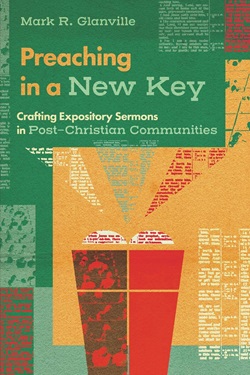 Preaching must connect with its hearers. As the perception of the pastor has changed in recent years, and as congregations battle with increasing doubt, preaching which appeals solely to rationality doesn’t resonate in the same way as it once did.
Preaching must connect with its hearers. As the perception of the pastor has changed in recent years, and as congregations battle with increasing doubt, preaching which appeals solely to rationality doesn’t resonate in the same way as it once did.
Post-Christian generations find themselves looking less for a charismatic authority figure and more for healthy leaders who are relationally connected to their neighbourhood. Scholar and pastor Mark Glanville provides a fresh look into the art of crafting sermons for post-Christian contexts.
In Preaching in a New Key – available in March – he teaches the craft of Christ-centred expository preaching from the ground up. Writing for both new and experienced pastors, Glanville recognizes that it is time for us to reset our compasses.
Bringing together elements that are too often apart, Preaching in a New Key teaches expository preaching integrated with creativity, cultural discernment, pastoral health, justice, missiology and more.
Filled with helpful resources for seminary students and pastors alike, this book includes:
- visual aids to help prepare for writing a sermon;
- guides for how to structure a sermon;
- examples that show how to implement preaching practices.
Dr Mark Glanville works as Director of the Centre for Missional Leadership at St. Andrew’s Hall at UBC. He is an Old Testament scholar, and has written five books, including Improvising Church and Refuge Reimagined. His vocational goal is to research, teach, write, speak and play music to nourish Christian leaders to creatively reimagine what the church can be and do in post-Christian societies, with the Bible in our hands. Mark is also a professional jazz pianist, active on the Vancouver jazz scene. Mark’s podcast is Blue Note Theology, which he hosts from the grand piano.
- Reg Reimer: On the Cruel Edges of the World: A Memoir of Carrying Help and Hope into Dark Places in Dangerous Times (independently published, 2024)
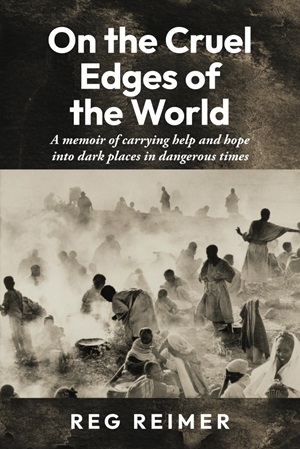 Now living in the Fraser Valley, Reg Reimer has led a colourful life in many nations around the world, particularly Vietnam, Thailand and Southeast Asia in general.
Now living in the Fraser Valley, Reg Reimer has led a colourful life in many nations around the world, particularly Vietnam, Thailand and Southeast Asia in general.
A missionary vocation set the stage for an extraordinary life of service for Reg Reimer. It required him to be by turns an evangelist, a professor, a first responder, a church planter, a chief executive, a writer, a development worker, a peacemaker, an advocate and a spy!
It took him into the suffering caused by the major man-made and natural disasters of our time – in the Vietnam War, the Cambodian and the Rwanda genocides, the African famines, the Great Asian Tsunami.
There he partnered with our compassionate God in lifting up the destitute, the downtrodden and the persecuted, making their way “as best they could on the cruel edges of the world” (Hebrews 11: 38 The Message).
These experiences led him to reflect deeply on human evil and human suffering, alongside the goodness and mercy of God.
I will write in more detail about On the Cruel Edges of the World before long.
- Jeremy Stewart: I, Daniel: An Illegitimate Reading of Jacques Derrida’s “Envois” (Peter Lang)
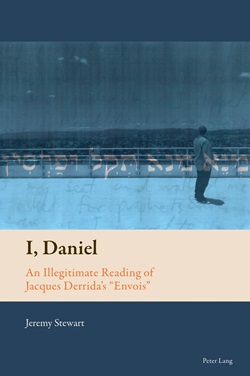 Jacques Derrida’s book The Post Card: From Socrates to Freud and Beyond (1987) has often been read in purely philosophical terms. Derrida, alluding to Freud’s talk of “theoretical fiction,” describes the opening section (“Envois”) as a “project for a ‘fiction.'” “Envois” (that is, “sendings”) takes the form of hundreds of postcards to an unnamed lover.
Jacques Derrida’s book The Post Card: From Socrates to Freud and Beyond (1987) has often been read in purely philosophical terms. Derrida, alluding to Freud’s talk of “theoretical fiction,” describes the opening section (“Envois”) as a “project for a ‘fiction.'” “Envois” (that is, “sendings”) takes the form of hundreds of postcards to an unnamed lover.
Enter a figure called Daniel. In some ways, he resembles Derrida’s unrecognized third son. In others, he resembles the author; this book’s creative-critical approach thus turns scandalously personal. In addressing literary questions, it draws on dreams, faith, the author’s middle name and a testimony to illegitimacy.
One of “Envois” key conceits is that it is “the preface to a book […] not [yet] written.” Taking, as cues, fleeting references to the biblical book of Daniel and George Eliot’s novel Daniel Deronda, “Envois” is read as a preface not so much to an unwritten book as to the text that is the name “Daniel.”
Benoît Peeters, author of Derrida: A Biography, wrote:
With I, Daniel, Jeremy Stewart offers a reading, both rigorous and adventurous, of ‘Envois,’ one of Jacques Derrida’s most fascinating works. Unfolding and refolding the text around a blind spot in the philosopher’s journey, seeking to recognize in the twists and turns of this variously encrypted text the traces of an unutterable filiation, he takes us with him into the labyrinth, losing ourselves to better find ourselves.
Through his personal commitment, Jeremy Stewart gives this close reading its full legitimacy, with the name ‘Daniel’ playing the role of révélateur, in the photographic sense of the term.
Jeremy Stewart is a Scholar-in-Residence at Regent College. His research interests include modern and contemporary literature, autotheory and the relationships between readers, writers and texts. Stewart was a SSHRC Doctoral Fellow at Lancaster University, from which he graduated with a PhD in English Literature. An electric guitarist, Stewart is the Artistic Director of Casse-Tête: A Festival of Experimental Music. He is a 2024-25 Veritas Scholar in the arts cohort under the mentorship of Dr. Mia Chung. He is also the author of three poetry collections.
- Andy Gabruch: Infobesity: How to be Followers of Jesus in an Information Overload World (Cascade Books)
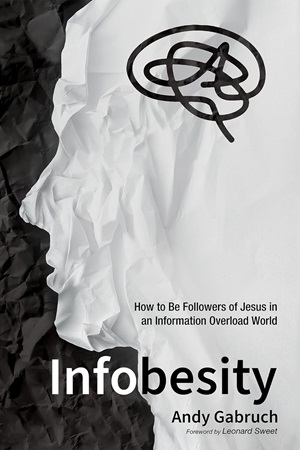 Have you ever experienced infobesity online? Have you ever been bombarded with fake information or disinformation that has distracted you from your work, key relationships, school or faith?
Have you ever experienced infobesity online? Have you ever been bombarded with fake information or disinformation that has distracted you from your work, key relationships, school or faith?
Well, we all have. Whether you are a stay-at-home parent, a student, a teacher, a construction worker, a pastor or anyone who has a social media account, you have experienced some form of infobesity.
For followers of Jesus, this book aims to explore why infobesity occurs, respond with practical ways to understand personal digital practices and habits and indicate how to redeem digital spaces.
David Wells, General Superintendent of The Pentecostal Assemblies of Canada, wrote:
The insights found in Infobesity are inter-woven into our philosophy and program applications as we seek to equip families, churches and ministries to connect with and mentor young women and men in a digitally saturated age. Infobesity is a book to not only be read but applied.
Derrick Hamre, Lead Pastor of Christian Life Assembly Church in Langley interviewed Gabruch January 18 on The Orange Pew podcast.
Andy Gabruch has been in ministry for over 20 years in urban, suburban and rural contexts. He has worked with high school assemblies across Canada, citywide youth forums, local governments, churches and national leadership boards, speaking on culture, leadership and ministry. Gabruch is a pastor at Hope Church (formerly Vancouver Chinese Pentecostal Church). He has a Master’s Degree in Leadership and Management from Briercrest Seminary and a Doctorate of Ministry in Semiotic Studies on Christ, Culture and the Church from George Fox University. He is married to Annick and has four children.
- John Neufeld: Who Speaks for God? (Good News Broadcasting Association of Canada)
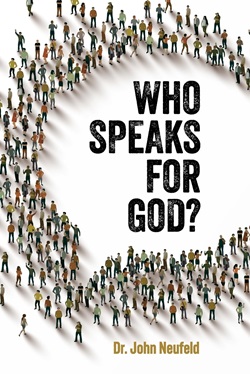 It is increasingly difficult to discern whose voice to trust in our society. Agendas slant messages. Facts are buried under discourse. Information is suspect, depending upon its source.
It is increasingly difficult to discern whose voice to trust in our society. Agendas slant messages. Facts are buried under discourse. Information is suspect, depending upon its source.
Nowhere is this struggle more vital than in matters of eternal truth. In Who Speaks for God?, Dr. John Neufeld guides us through Biblical teaching to discern who has the authority and truth of God’s Word. “Who speaks for God?” A vital question for today’s Church.
Dr. John Neufeld, Bible teacher of Back to the Bible Canada (based in Abbotsford), is well known internationally for his excellence in expositional Bible teaching. He is a graduate of Columbia Bible College (Biblical Studies), the University of Saskatchewan (BA), Fuller Theological Seminary (MDiv.) and Trinity Evangelical Divinity School (DMin). He has served churches in Saskatchewan, California and BC as a church planter and pastor. He was senior pastor at Willingdon Church in Burnaby for 15 years.
- Fr. David C. Bellusci, OP: Christian Armor: The Rosary and the Bible (Wipf and Stock)
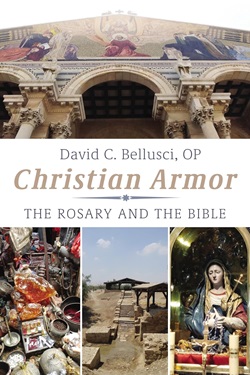 The Rosary signifies prayer – a form of daily prayer and meditation for millions of Roman Catholics across the world – and has been for centuries. The Rosary unites the followers of Christ as one family in a common faith, baptism and Lord. The power of the Rosary stems not only from the intercession of the Mother of our Saviour, but each of the 20 mysteries finds its source in the Bible.
The Rosary signifies prayer – a form of daily prayer and meditation for millions of Roman Catholics across the world – and has been for centuries. The Rosary unites the followers of Christ as one family in a common faith, baptism and Lord. The power of the Rosary stems not only from the intercession of the Mother of our Saviour, but each of the 20 mysteries finds its source in the Bible.
The truth of the word of God teaches us not only that the Father sent his Son to save us from our sins so we may have eternal life, but also how we live our communion with Christ through our daily choices. The Rosary and the Bible lead us to Jesus Christ; the Scriptures point to Jesus, and Jesus is at the very centre of the Rosary.
Christian Armor describes how the Rosary and the Bible provide us with the armor we need to help us in combat: against Satan’s deceptions, lies and attacks. To know the truth, we need the word of God, and to live in truth Jesus gives us his mother at the cross: “This is your mother.” We need the grace of God, Mary’s intercession and the word of God in spiritual combat.
Born in Vancouver, Dominican priest David Bellusci has written eight books, including four books of poetry. He holds a BA in English literature, MA in linguistics, MFA in creative writing, PhD in philosophy and PsyD in clinical pastoral psychotherapy. Bellusci’s poems have been published in Australia, Canada, India, New Zealand, the UK and the USA. He is a member of the Writers’ Union of Canada and teaches philosophy and theology at Catholic Pacific College in Langley. He introduced the book in The B.C. Catholic.
- Jack A. Taylor: When Ministry and Marriage Collide: Honest Conversations on Thriving Through Conflict (Word Alive Press)
 Over 25 percent of marriages among today’s ministry leaders face significant struggle and strain. The demands and temptations of our public and private worlds often create a tension that pushes our love relationships to the breaking point.
Over 25 percent of marriages among today’s ministry leaders face significant struggle and strain. The demands and temptations of our public and private worlds often create a tension that pushes our love relationships to the breaking point.
Through honest conversations with seven couples, Jack Taylor reveals five quagmires that can capture the souls of dedicated leaders.
Areas like identity, attachment, calling, family and intimacy can seem straightforward until you’re stuck in the challenges they present. When Ministry and Marriage Collide provides over 50 practical tools to help strugglers move from striving to thriving.
Ideally, this work is designed to be paired with a relationship coach (see 1heartcoaching.com), but it is sufficient on its own to produce significant conversations with anyone willing to delve into the roots of their challenges.
Based on crucial training from the Thriving Relationship Center, readers will discover the five stages of thriving relationship growth and six foundational pillars for healthy intimacy and communication.
After the vows – in the middle of real life – investing in your most important earthly relationship is vital to avoid becoming another statistic. While the couples described here are fictional composites, the issues they deal with are anything but imaginary.
Jack Taylor spent his early years as a missionary kid in Ecuador where his parents took up the call to replace five martyred missionaries. After marrying Gayle he relished 18 years working with missionary kids in Kenya. He recently retired as pastor of Faith Baptist Church in east Vancouver, which welcomes 60 different nationalities into a multicultural mosaic. With a PhD in counseling and three masters degrees, he’s studied biblical history for 40 years, traveled extensively in Galilee and written eight books set in that era and region. Ed and Janice Hird wrote about the book for Light Magazine.
- Bea Oertel: The Warehouse (Friesen Press)
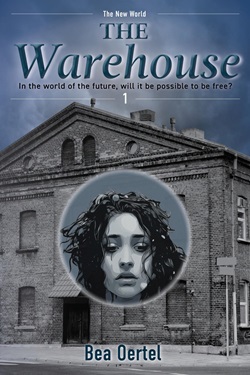 The Warehouse is a young adult science fiction novel set about 100 years in the future in a city somewhere in North America. Wars and drought have turned the land into a desert. Food is scarce and a tyrannical world government is in charge.
The Warehouse is a young adult science fiction novel set about 100 years in the future in a city somewhere in North America. Wars and drought have turned the land into a desert. Food is scarce and a tyrannical world government is in charge.
The plot centres around a young girl, Kim, who escapes a concentration camp and seeks refuge in a safe house on the outskirts of the city. An older lady, Sharon, takes Kim under her wing and strengthens her physically and emotionally. Restored to health, Kim helps Sharon distribute the food harvested in an illegal garden in the attic of the warehouse.
Kim becomes active in the resistance against the tyrannical government, even though she is traumatized and fearful of being recaptured. She saves another escapee from the dangerous borgs, hybrid humanoid robots who work for the government.
Sharon takes her young mentees to Eden Valley, where a group of escapees has built a new, self-sufficient community that actively resists the dictatorship of the One World Government. On the way to Eden Valley, Kim overcomes her fear of the dark and discovers her identity.
The novel culminates in Kim rescuing her sister from a forced rehabilitation centre in a daring game of disguise. Kim gets caught and resists the brainwashing strategies of government minions by declaring the truth about herself and her loved ones. Will she escape the rehab centre and be able to rejoin her loved ones?
Bea Oertel teaches writing at Coquitlam College in Vancouver. She is an avid reader of science fiction and fantasy novels and has been dabbling in creative writing all her life, writing short stories and poetry. In her spare time, when she is not writing dystopian novels, Bea is found camping and hiking all over BC with her trusty four-legged companion Almendra. Currently, she is working on part two of The New World trilogy. New ideas are percolating in her mind like espresso.
- Marja Bergen: One Such as Me? Pioneering Spiritual Mental Health Support (Blurb)
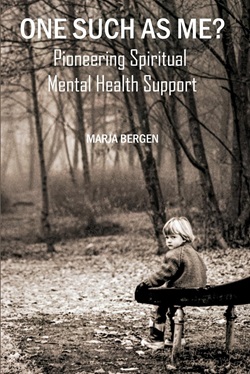 With this story, Marja Bergen decided to shut the door on the pain of the stigma in her past and focus only on how she helped God raise mental health awareness among Christians from the years 2000 and 2014. One Such as Me? offers a thorough account of the impact her extensive speaking and writings made in Canada and beyond.
With this story, Marja Bergen decided to shut the door on the pain of the stigma in her past and focus only on how she helped God raise mental health awareness among Christians from the years 2000 and 2014. One Such as Me? offers a thorough account of the impact her extensive speaking and writings made in Canada and beyond.
The reader will be taken behind the scenes, into a heart that knows God’s love and wants to share that love with others. She shows how much God can do through a person who trusts him, despite great challenges. Marja has given spiritual mental health support for 18 years, through Living Room and her many writings.
Marja Bergen decided long ago that she wanted to fight the stigma attached to mental illness. She has done that with her writing, starting with an article in the Vancouver Sun in 1993. Many articles followed and then, in 1999, a book that is still in print: Riding the Roller Coaster: Living with Mood Disorders. In 2005, she narrowed her focus by raising awareness in the church. A Firm Place to Stand: Finding Meaning in a Life with Bipolar Disorder was published in 2008.
Go here for earlier round-ups of local books.
